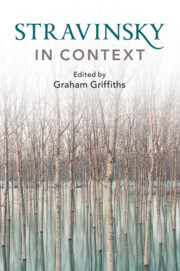Book contents
- Stravinsky in Context
- Composers in Context
- Stravinsky in Context
- Copyright page
- Contents
- Illustrations
- Contributors
- Preface
- Abbreviations
- Frontispiece
- Epigraph
- Part I Russia and Identity
- Part II Stravinsky and Europe
- Part III Partnerships and Authorship
- Part IV Performance and Performers
- Part V Aesthetics and Politics
- Chapter 23 Stravinsky versus Literature
- Chapter 24 Stravinsky and Greek Antiquity
- Chapter 25 Stravinsky’s Response to Japonisme
- Chapter 26 Stravinsky, Modernism and Mass Culture
- Chapter 27 Perspectives on Schoenberg and Stravinsky: Adorno and Others
- Chapter 28 Stravinsky’s ‘Problematic’ Political Orientation during the 1920s and 1930s
- Part VI Reception and Legacy
- Recommendations for Further Reading and Research
- Index
- Endmatter
Chapter 23 - Stravinsky versus Literature
from Part V - Aesthetics and Politics
Published online by Cambridge University Press: 03 December 2020
- Stravinsky in Context
- Composers in Context
- Stravinsky in Context
- Copyright page
- Contents
- Illustrations
- Contributors
- Preface
- Abbreviations
- Frontispiece
- Epigraph
- Part I Russia and Identity
- Part II Stravinsky and Europe
- Part III Partnerships and Authorship
- Part IV Performance and Performers
- Part V Aesthetics and Politics
- Chapter 23 Stravinsky versus Literature
- Chapter 24 Stravinsky and Greek Antiquity
- Chapter 25 Stravinsky’s Response to Japonisme
- Chapter 26 Stravinsky, Modernism and Mass Culture
- Chapter 27 Perspectives on Schoenberg and Stravinsky: Adorno and Others
- Chapter 28 Stravinsky’s ‘Problematic’ Political Orientation during the 1920s and 1930s
- Part VI Reception and Legacy
- Recommendations for Further Reading and Research
- Index
- Endmatter
Summary
Stravinsky was a composer frequently given to announcing music’s independence from the other arts – in particular, its independence from literature. ‘In general’, he wrote in a well-known screed of 1924, ‘I consider that music is only able to solve musical problems; and nothing else, neither the literary nor the picturesque, can be in music of any real interest.’1 Almost forty years later he still defined music in anti-literary terms, asserting (in an article for the official newspaper of the Communist Youth League, of all things): ‘The language of music is a special language; it is not the same as the language of literature.’2
- Type
- Chapter
- Information
- Stravinsky in Context , pp. 205 - 212Publisher: Cambridge University PressPrint publication year: 2020

